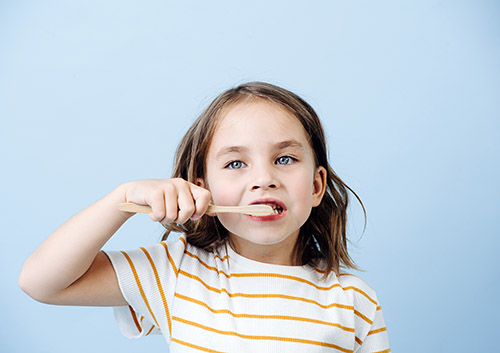Taking Care of Your Toothbrush
February 7th, 2024

One of the best ways to take care of your teeth is to brush them twice each day for two minutes each time. And brushing works even better when you take care of your toothbrush! Let’s look at some easy toothbrush rules to keep yourself, your teeth, and your brush healthy.
- Don’t Share
You can share toys, or share games, or share stories—but don’t share your toothbrush! Germs can hide on your brush. If you have a cold, you don’t want to give it to others. And if your family member or friend has a cold, you don’t want to catch it! This also means that toothbrushes shouldn’t touch each other while they’re drying. Separate brushes are healthy brushes.
- Keep Your Brush Clean
After you finished brushing your teeth, you might notice some toothpaste suds sticking to your brush—or even bits of the food you’ve just brushed off your teeth. Keep your brush clean by rinsing off all the toothpaste and food crumbs before you put it away. And it’s always a good idea to wash your hands before you brush to get rid of any germs which you don’t want to share with your brush—or your mouth.
- Stand (It) Up Straight
Let your toothbrush dry standing up, with the bristle end on top. That way your brush can air-dry quickly. Germs like to grow in dark, damp spaces, so don’t put your toothbrush in a case while it’s wet. If you take your brush to school or on a trip, make sure your brush is dry before you pack it away.
- Don’t Keep Your Brush Too Long
After about three months, no matter how well you take care of your toothbrush, you’ll be needing a replacement. Bristles get worn out after weeks and weeks of brushing twice a day, and just can’t clean as well as they did when they were new.
- Don’t Forget Regular Checkups
Regular cleanings at our Bowie pediatric dental office and exams with Drs. Richee Berry, Bryce Miller, Jarrett Caldwell, Nicholas Gordon will remove any plaque you missed and keep your smile clean and bright.
Keep your toothbrush to yourself, keep it clean, keep it dry, and don’t keep it too long—and you’ll help keep yourself, your teeth and your toothbrush in good health!


